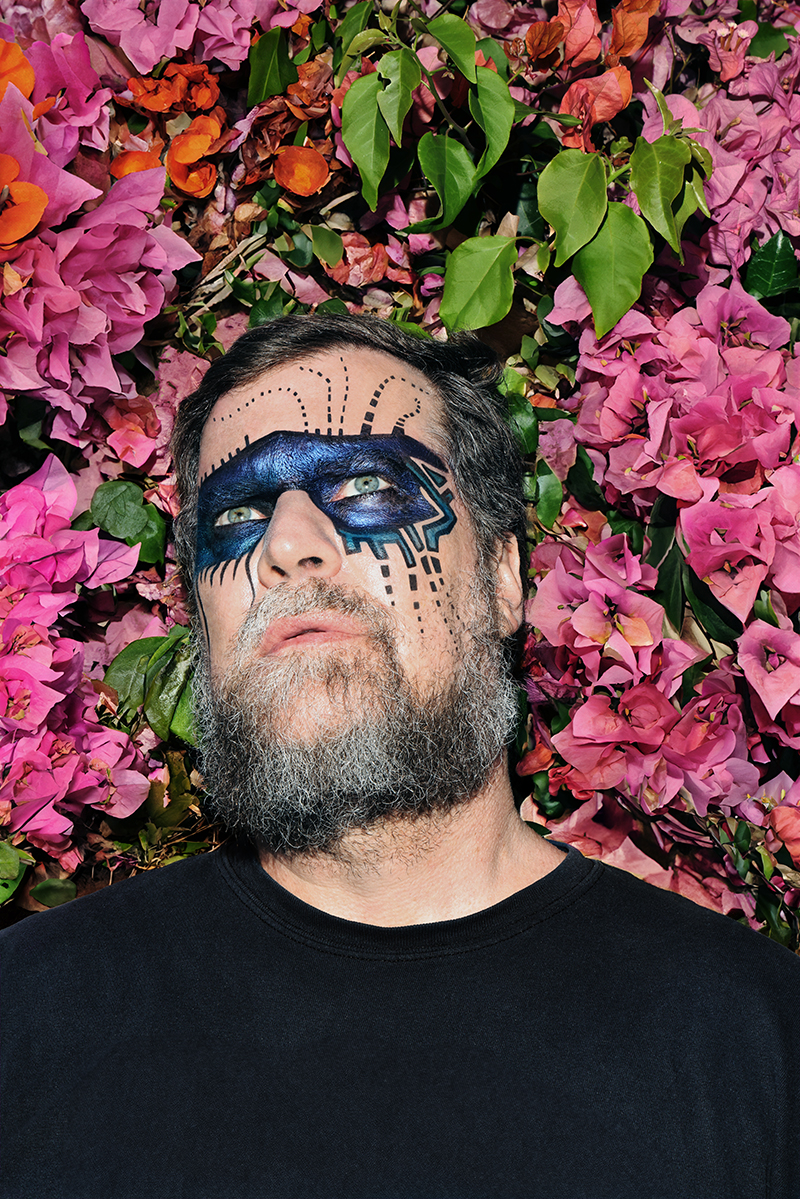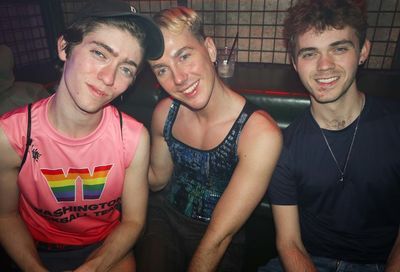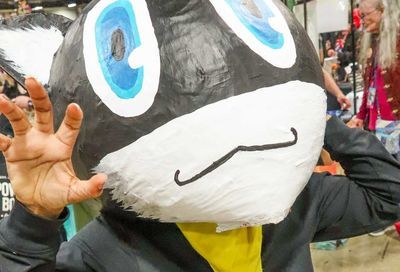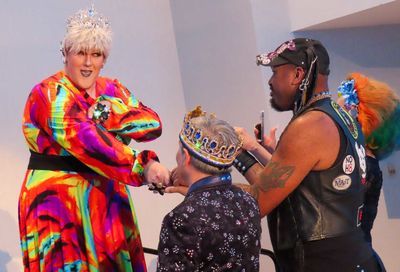Space Age Plastic
Bev Stanton's Electronic Charge
Photograph by Michael Wichita
“The missile knows where it is at all times. It knows this because it knows where it isn’t by subtracting where it is from where it isn’t, or where it isn’t from where it is, whichever is greaterÂ… ”
 |
These words form the opening drone of Nadir, Arthur Loves Plastic’s most recent creation. They waft just under the surface of a sluggish drum loop, recited with vapid good cheer, an educational filmstrip voiceover that is the verbal equivalent of Muzak. You find yourself hypnotically lulled through the song, the way a soft, cyclical melody might keep you blankly wandering the aisles at Macy’s.
This knack for puréeing quirky banality into a mesmerizing groove has made Bev Stanton, the woman behind the subject-and-predicate moniker, a virtual touchstone in her genre. Based in Silver Spring, Stanton’s work is a mixture of loops, samples and vocals, less airy than Moby, more playful than Orbital, and, she’s been told, well suited for a day of whisking the couch.
“People recommend listening to my music while doing housework, ” she says. “I get that response consistently. ”
Stanton began her life as a musician in 1992 playing bass for various indie bands. One of those bands, And Then There Were None — named for the Agatha Christie novel because they kept losing members — provided her first brush with electronic music. After saying goodbye to yet another drummer, the band decided to use a drum machine instead. As other band members departed, they, too, were replaced with more electronics.
“As we kept integrating more of the MIDI stuff, it started to become our m.o., ” says Stanton. “After a while, the band wanted to get back to basics, so I started Arthur Loves Plastic as a side project. ”
Named for her cat, who has a soft spot for plastic bags, Arthur Loves Plastic has become a globally recognized name in what could be called experimental electronica, an achievement made possible by the Internet. Since music of this type is basically slivers and chunks of different sounds all mixed together, it’s ideal for WAV file sharing with other artists who have created sounds of their own. The Tapegerm Collective, an online community, most of whom have never met in real life but nonetheless collaborate on songs, is the source of much of Stanton’s material.
“Sometimes it’s just too much to start with a blank slate, ” she says. “With Tapegerm, we can all upload loops to the server and get inspiration from each other. Otherwise you’re just creating in a vacuum. ”
|
Stanton supplements these connections by spinning live, although she admits that spinning is “more of a means to an end. ”
“For some reason, people want to see me push a button, ” she says, bewildered.
And because being a female in this genre is a bit like being the only girl in the tree house, she’s also a part of the First Ladies DJ Collective, a female DJ community that, she points out, is a “a valid way to correct an imbalance, ” and not about “ghettoizing by gender. ”
“Plus I’m too shy to go out and get gigs myself, so I hang out with these girls, ” she adds.
“These girls ” make up Stanton’s folk-free existence — an anomaly in the lesbian community, she feels, where so many women seem to be up to their organic hemp sandals in acoustic guitars and empowerment.
“Why are lesbians so granola? ” she asks. “I don’t get all the Lilith Fair stuff. It perplexes me to no end. ”
But she also believes that the formally rigid boundaries demarcating “gay music ” — folk for women, house for men — are dissolving as the community becomes more self-aware. Locally, Stanton joins gay musicians Richard Morel and Bob Mould as artists eschewing these borders. Also, parties like Feint and Filler in Adams Morgan are pushing the limits of what people expect from queer events.
“I think there’s always been gays you can’t pigeonhole, ” she says. “The bigger phenomenon is that now they’re getting print. You always had Cole Porter, Billy Strayhorn, but the stereotypes are now getting buried. ”
And as this occurs, gay artists are increasingly free to utilize their talents for different causes. Stanton, who works for the Drug Policy Alliance, an organization that lobbies for drug law reform, has incorporated her job into her music, collaborating on an album called No More Drug War. Her contributed song, “America’s Apartheid, ” decries what she sees as a war being waged on culture, and samples sound bytes from a video put out by the Drug Policy Alliance.
“The drug war has always been a war on cultures in some respects. Jazz musicians, [hippies] and now the rave scene, ” she says. “It’s like, the drunk frat boys are fine, but the legislators will target these cultural groups. ”
Though raves and electronic music events have lost some of their dark mystique, Stanton thinks “the taboo factor is still pretty significant, ” citing the RAVE Act, a bill introduced in the Senate that specifically targeted rave promoters for prosecution.
“The scene’s been co-opted into pop culture, ” she says, “but I think a lot of parents still don’t understand what it’s about. ”
Stanton became frustrated enough with that sort of parental sheltering to move out of her former neighborhood, Takoma Park, where she saw only “parents who wanted to raise their kids in a hermetically sealed environment. ”
“There’s only so many speed-bump petitions you can sign in one lifetime, ” she says of her traffic-conscious former neighbors. “In Takoma Park, they all act like they’re into diversity, but when it gets right down to it, they’re the most Not-In-My-Backyard people you’ve ever met. ”
Too orthodox a natural habitat for an experimental musician named for her pet’s favorite toy, though Stanton admits that her groove-oriented nature sometimes renders her ostracized by experimental purists. She tries not to “think in terms of her audience ” when creating, and shies away from self-promotion. Hence, the pseudonym.
“I think the names I invent are better than the one my parents did. ”
Arthur Love Plastic’s CD release party takes place Saturday, February 22, at 8 p.m., at the Montgomery Community College Planetarium, located at Takoma Avenue and Fenton Street in Takoma Park, MD. Visit www.arthurlovesplastic.com for more info.
Support Metro Weekly’s Journalism
These are challenging times for news organizations. And yet it’s crucial we stay active and provide vital resources and information to both our local readers and the world. So won’t you please take a moment and consider supporting Metro Weekly with a membership? For as little as $5 a month, you can help ensure Metro Weekly magazine and MetroWeekly.com remain free, viable resources as we provide the best, most diverse, culturally-resonant LGBTQ coverage in both the D.C. region and around the world. Memberships come with exclusive perks and discounts, your own personal digital delivery of each week’s magazine (and an archive), access to our Member's Lounge when it launches this fall, and exclusive members-only items like Metro Weekly Membership Mugs and Tote Bags! Check out all our membership levels here and please join us today!
























